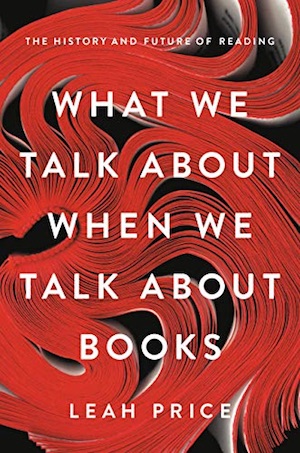By Kelly Parrett
Leah Price’s What We Talk About When We Talk About Books: The History and Future of Reading (Basic Books, 2019) received Phi Beta Kappa’s 2020 Christian Gauss Award. Established in 1954, this award honors the late Christian Gauss, a distinguished Princeton University scholar, teacher, and dean who also served as president of Phi Beta Kappa. Past winners include literary scholars and critics such as Imani Perry, Laura Dassow Walls, and Ruth Franklin.
Price (ΦΒΚ, Harvard University) is a professor at Rutgers University, where she teaches courses on the novel, British culture in the 18th and 19th centuries, gender, and book history. At Rutgers, she also founded the Initiative for the Book. Her previous published works include How to Do Things with Books in Victorian Britain (Princeton University Press, 2012) and The Anthology and the Rise of the Novel: From Richardson to George Eliot (Cambridge University Press, 2000). Price has also written pieces on new and old media for The Boston Globe, The New York Times Book Review, The London Review of Books, The Times Literary Supplement, and The San Francisco Chronicle.
What We Talk About When We Talk About Books is a discussion of the past, present, and future of reading for all audiences, not just academic readers. Price argues that while we might expect the increased importance of technology in the modern world to negatively impact reading, this has not been the case. Instead, Price proves that there never was a true “golden age” of reading; readers throughout time have always multitasked, skimmed, and lost focus while reading, much the same as readers in the digital age. In this way, Price’s writing offers hope: the future of reading will most definitely persist, even as technology continues to advance.
“The evidence that books are dying proves even scarcer [than a golden age of reading],” Basic Books describes. “In encounters with librarians, booksellers, and activists who are reinventing old ways of reading, Price offers fresh hope to bibliophiles and literature lovers alike.”
INTERVIEW
What was your inspiration to write about the past, present, and future of reading?
PRICE: As a child, I moved around a lot, so I spent a lot of time living in sublets full of books that belonged to strangers. Speculating about them made me curious about what clues books offer about their owners.
You talk about the “myth of exceptionalism” that implies we live in unprecedented times due to an increase in technology. While one might expect that the digital era would make reading a thing of the past, this has not been the case. How do you think the future of reading will be impacted as technology becomes increasingly advanced?
PRICE: Ever since the advent of digital text in the last century, readers have been bracing ourselves to mourn the habits of mind that books had once occasioned: the capacity to follow a demanding idea from start to finish, to look beyond the day’s news, to be alone. But the current pandemic is showing us the solace that books provide in tough times. Book buying and book borrowing are both holding steady even as other kinds of consumption slump. Government may exclude books from the category of “essential goods”—as even Amazon did, despite having made its start as a bookseller—but Americans seem to be treating reading as essential.
As you tell the history of literature, it seems important for all of us. Literature courses are included in many liberal arts curriculums, regardless of a student’s major. What do you believe is the importance of being immersed in literature for all students, not just English majors?
PRICE: My book argues less for the importance of literature (a string of words) than for the importance of the book (an object that travels through particular infrastructures and prompts particular attachments). The case it makes for thinking about the channels through which words reached our hands—who wrote them, manufactured them, distributed them, catalogued them—seems newly vital now, as we see our country held hostage to battles over the reliability of different news sources.
Can you share your response to receiving the Christian Gauss Award from Phi Beta Kappa?
PRICE: Thrilled and floored! I’m grateful for this vote of confidence in the future of reading.
Kelly Parrett earned her bachelor’s degree in English literature from SUNY Geneseo, where she was inducted into Phi Beta Kappa in May 2020. SUNY Geneseo is home to the Alpha Delta of New York chapter of Phi Beta Kappa.




